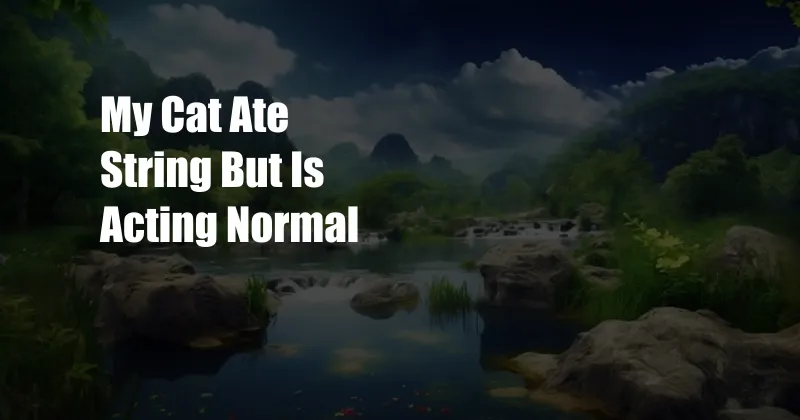
My Cat Ate String but Is Acting Normal: A Detailed Guide
Cats are known for their playful nature and curious personalities, which can sometimes lead them into trouble. One common issue cat owners encounter is their pet ingesting foreign objects, such as string. While this can be a frightening situation, it’s important to remain calm and assess the situation carefully. This article provides a comprehensive guide to what to do if your cat ate string but is acting normal, including symptoms to watch for, potential risks, and steps to take for your feline’s well-being.
Symptoms of String Ingestion in Cats
If you suspect your cat has eaten string, it’s essential to observe its behavior closely. While some cats may show no signs of distress, others may exhibit symptoms such as:
- Vomiting
- Diarrhea
- Lethargy
- Loss of appetite
- Abdominal pain
- Straining to defecate
- Excessive panting
If your cat displays any of these symptoms, it’s crucial to seek veterinary attention promptly. Even if your cat is acting normal, it’s still advisable to contact your veterinarian for guidance and reassurance.
Potential Risks of String Ingestion in Cats
String ingestion can pose several risks to cats, including:
- Gastrointestinal obstruction: String can become lodged in the digestive tract, causing an obstruction. This is a serious condition that can lead to vomiting, dehydration, and even death if left untreated.
- Linear foreign body: When string travels through the digestive tract, it can cut and damage the intestines, leading to severe pain and infection.
- Peritonitis: If string punctures the intestines, it can leak digestive contents into the abdominal cavity, causing inflammation and infection.
The severity of the risks depends on the amount and type of string ingested, as well as the individual cat’s health and size.
What to Do if Your Cat Ate String
If you’re certain or suspect your cat has eaten string, follow these steps:
- Remain calm: Panicking will only make the situation worse for you and your cat.
- Monitor your cat: Observe your cat’s behavior closely for any signs of distress, such as vomiting, diarrhea, or lethargy.
- Contact your veterinarian: Even if your cat is acting normal, it’s essential to contact your veterinarian for advice and guidance. The veterinarian may recommend inducing vomiting or using other methods to remove the string.
- Follow your veterinarian’s instructions: If your cat needs to be treated, follow your veterinarian’s instructions carefully to ensure the best possible outcome.
Tips and Expert Advice for Cat Owners
To prevent string ingestion and protect your cat’s health, consider these tips and expert advice:
- Remove string from your home: Keep string, thread, yarn, and other similar materials out of reach of your cat.
- Supervise play: When you’re playing with your cat, use toys specifically designed for cats and avoid using string or other potentially dangerous objects.
- Be vigilant: Watch your cat carefully when it’s exploring or playing to make sure it doesn’t ingest anything harmful.
- Get regular checkups: Schedule regular veterinary checkups to ensure your cat is healthy and to discuss any concerns you have about string ingestion.
By following these tips, you can help reduce the risk of your cat ingesting string and ensure its safety and well-being.
FAQ on String Ingestion in Cats
- Q: Can my cat pass string on its own?
- Yes, it’s possible for cats to pass small amounts of string on their own. However, it’s still crucial to monitor your cat and seek veterinary advice if you suspect it has ingested string.
- Q: How do I know if string has caused an obstruction in my cat?
- Signs of a gastrointestinal obstruction in cats include repeated vomiting, constipation, diarrhea, lethargy, and abdominal pain. If you suspect an obstruction, seek veterinary attention immediately.
- Q: What is the best way to prevent my cat from eating string?
- The best way to prevent string ingestion is to remove all string, thread, and similar materials from your home and to supervise your cat’s play. Regular veterinary checkups are also essential for discussing string ingestion and other potential health concerns.
Conclusion
String ingestion in cats can be a serious issue, but it can be managed with prompt veterinary care and proper precautions. By following the guidelines outlined in this article, you can prevent accidents, recognize symptoms, and take appropriate actions to keep your feline companion healthy and happy. Remember that your pet’s well-being is in your hands, so be vigilant, seek professional advice when necessary, and always prioritize your cat’s health.
Is this topic of interest to you? Do you have any questions or comments? Let us know in the discussion section below, and we’ll be happy to provide further assistance.